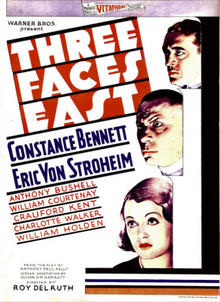| Three Faces East | |
|---|---|
 theatrical release poster | |
| Directed by | Roy Del Ruth |
| Written by | Oliver H. P. Garrett Arthur Caesar |
| Based on | Three Faces East (play) by Anthony Paul Kelly |
| Produced by | Daryl Zanuck |
| Starring | Constance Bennett |
| Cinematography | Barney McGill |
| Edited by | William Holmes |
| Music by | Paul Lamkoff |
| Distributed by | Warner Bros. Pictures, Inc. |
Release date |
|
Running time | 71 minutes |
| Country | United States |
| Language | English |
Three Faces East is a 1930 American pre-Code film directed by Roy Del Ruth and starring Constance Bennett and Erich von Stroheim. Produced by Daryl Zanuck and released by Warner Brothers it is based on a 1918 Broadway play about World War I spies, Three Faces East, by Anthony Paul Kelly. [1] It was filmed as a silent in 1926. [2] A later remake in 1940 starred Boris Karloff and Margaret Lindsay was titled British Intelligence .